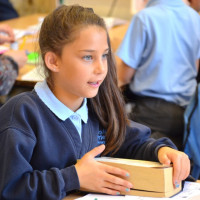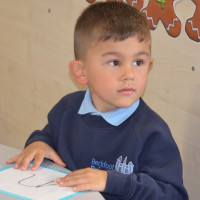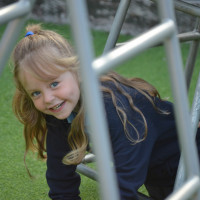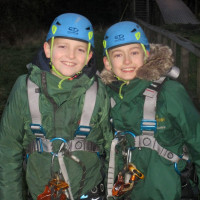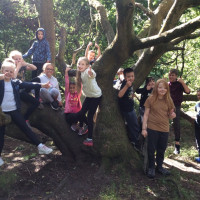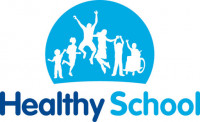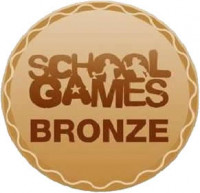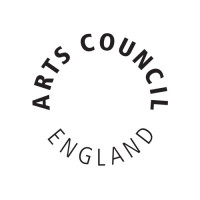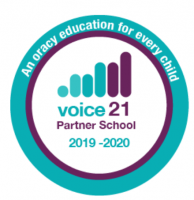Oracy at Priestthorpe
What is Oracy?
Oracy involves embracing different speaking skills, such as:
- Discussion: exchanging ideas with others
- Instruction: telling someone what to do, or explaining facts
- Dialogue: having a conversation with someone, listening and showing an interest in what they say
Oracy and speaking and listening skills in the National Curriculum
Oracy may not be officially assessed by SATs, but it’s an important part of the National Curriculum, and not just in English.
‘Spoken language is a requirement across the curriculum because it helps students to express and explore ideas before they commit them to paper, supporting the development of reading and writing,’ Billie explains.
‘More than this, talking through an idea, problem or finding enables pupils to share their thinking and learn from each other.’
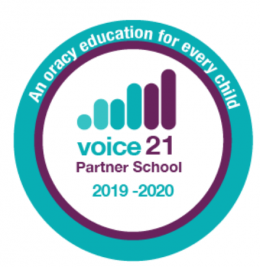 Voice 21 Partnership
Voice 21 Partnership
This year, Beckfoot Priestthorpe Primary is working in partnership with Voice 21 to promote Oracy and develop the skills of every child.
The aim of the project - https://voice21.org/oracy/partner-school-programme/
Develop a whole school culture of oracy
We work in partnership with schools committed to building and embedding a culture of oracy. As a Partner School, we will work alongside you to raise the tide of talk in your school. Whether this is through innovative curriculum design, inspiring whole-school oracy showcases, or refining pedagogy in classrooms, we support you to identify your strategic priorities for oracy development and help you to deliver against them.
What does Oracy look like at Beckfoot Priestthorpe?
| Oracy Activity Ideas for the Classroom | |
|---|---|
|
General Classroom Routines |
Talk rules in place in every classroom |
|
Talk partners |
|
|
Directed questioning |
|
|
Following instructions |
|
|
Peer teaching/modelling |
|
|
Working in groups |
|
|
Recap social enterprise activities to whole class |
|
|
Show and tell |
|
|
Picture News assemblies |
|
|
Watch Newsround and discuss the news |
|
|
Weekly weather watch – long term forecast |
|
|
Presenting Home/School projects |
|
|
Children’s leadership group meetings |
|
|
Play leaders |
|
|
Year 6 / Reception children buddies |
|
|
|
|
|
Core subjects |
PowerMaths |
|
Maths problem solving |
|
|
Collaborative writing |
|
|
Reciprocal Reading lessons |
|
|
Reading aloud/daily morning reading with parents |
|
|
Reading the class book – questioning and discussion |
|
|
|
|
|
Drama ideas |
Freeze framing/Q&A |
|
Hot seating |
|
|
Acting out a story |
|
|
Conscience alley |
|
|
Feedback in character |
|
|
Statue Speaker/Speaker’s Corner |
|
|
Green screening |
|
|
Mock trials |
|
|
Chat shows |
|
|
Public meetings |
|
|
Create a Vlog |
|
|
|
|
|
Performances
|
School performances -shows |
|
Class assemblies |
|
|
Persuasive speech |
|
|
Debates |
|
|
Group performances of poems |
|
|
Public Service Announcements |
|
|
Cookery Show |
|
|
PowerPoint presentation |
|
|
Video diaries |
|
|
|
|
|
Continuous Provision |
Role play corner |
|
Small world |
|
|
Block play |
|
|
Sentence stems for play |
|
|
|
|
|
Interaction with the public |
Interview a visitor |
|
Skype someone from another place |
|
|
Open Days – showing visitors around |
|
|
|
|
|
Language development |
Play ‘I spy’ |
|
Pictionary |
|
|
Play Guess who? |
|
|
Matching games |
|
7 ways to promote oracy at home
Try these techniques to help your child become a more confident communicator, in school and at home.
1. Read aloud to your child
‘Reading aloud to your child, well beyond the age they can read for themselves, combines the benefits of talking, listening and storytelling within one activity that helps children build their vocabulary, learn to express their thoughts, and understand the structure of language,’ says Billie.
2. Record a video diary
Many kids aspire to being vloggers or YouTube stars, so encourage them to start a video diary, either to chart their everyday life or to record special occasions like birthdays and holidays. For safety’s sake, keep these within the family rather than broadcasting them online.
3. Play word games
Games like 20 Questions, Guess Who? and I Spy are great for helping children use descriptive language and think critically about what they’re saying.
4. Talk about their day
Ask your child, ‘What did you do today?’ and they’ll often claim they can’t remember, so find different ways to talk about what they’ve been up to. Eating your evening meal as a family is a good way to encourage conversation, while older kids are often more chatty in the car, where they feel less like they’re being interrogated. You could also try our tips for asking the right questions to elicit information.
5. Phone a friend (or relative)
Persuade your child to take a break from text and WhatsApp and develop their speaking skills by making an actual phone call. ‘Encouraging them to speak to different family members on the phone or on a video call will build confidence,’ says Billie.
6. Go on a nature walk
This is a great pre-phonics activity for young children, who can be encouraged to listen carefully to the sounds they hear – from traffic to birdsong – and describe them. They can also describe the natural sights they see, such as trees, animals and birds and the sky.
7. Sign them up for a club
Joining extracurricular clubs is a good opportunity for your child to converse with different people outside the home or school environment. Many of them also involve taking instructions (such as being coached in sporting techniques or to complete science or art projects), and introduce them to different vocabulary relating to their new hobby.

